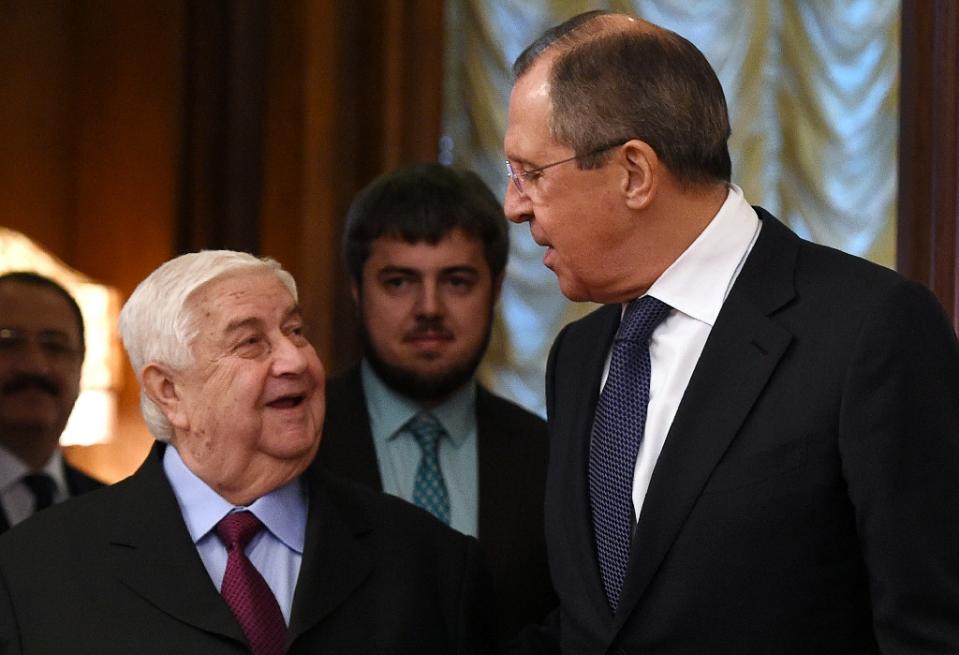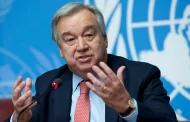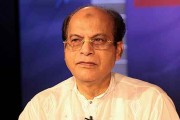
Professor Nurul Islam accepting the BDI Lifetime Achievement Award from BDI President, Professor Munir Quddus
e-News® | The NEWS Company…DHAKA, Nov 17, 2015 : An International conference on Bangladesh organized by the Bangladesh Development Initiative (BDI) has just concluded (November 6-8, 2015) at the University of California, Berkeley. The conference, “Development and Democracy in Bangladesh: Problems and Prospects” was co-hosted by the Institute for South Asia Studies and the Chowdhury Center at UC Berkeley.
The conference was well-attended with nearly 150 participants. Researchers, experts and policymakers from the United States, Bangladesh, Germany, Australia, were joined by members of the Bangladeshi Bay Area community and from the UC Berkeley. The attendees were diverse – scholars, academics, government officials, bankers, diplomats, business people, policy makers, students, engineers, architects, entrepreneurs, artists, and members of the global Bangladeshi diaspora. Overall, the participants spoke about the bright future of the nation, provided the government can nurture true democracy, support entrepreneurs to continue expanding exports of garments and other manufactured products, control extremism, and maintain law and order to substantially increase the flow of foreign direct investment, especially in information technologies.
In his welcome remarks, Professor Munir Quddus, President of BDI, explained that BDI is a professional organization composed of independent scholars who are passionate about their vision of a prosperous and democratic Bangladesh. BDI is nonpartisan and believes in an interdisciplinary approach to solving the challenges of development and democracy. Given the lack of dialogue between the major political parties in Bangladesh today, the conference theme was selected to emphasize the critical link between democracy and development. An important part of BDI’s mission is to support good, solid research that will inform and guide policymakers, and impact trends in the private sector. To achieve these goals, BDI publishes a scholarly journal (The Journal of Bangladesh Studies), plays and advocacy role, and partners with a number of organizations such as PRI, AEDSB, BEN and AIBS. More information on BDI is available on its homepage, www.bdiusa.org. There are multiple goals for these conferences – education, networking among scholars, supporting young scholars, honoring established scholars, nurturing and developing new ideas to help solve Bangladesh’s complex problems. The overall goal is to build up “Brand Bangladesh” in the United States and globally.
In his keynote speech, Dr. Atiur Rahman, Governor Bangladesh Bank, outlined numerous measures taken by the Bangladesh Bank to strengthen monetary policy, develop entrepreneurship, protecting the environment, and move banking and development towards a poor-friendly environment. He spoke of the overall achievements of the Bangladesh economy, the sizable in increase in the foreign exchange reserves, and the low and stable inflation environment. He invited members of the Bangladeshi diaspora to invest in Bangladesh, and said that the government and the Central Bank will welcome their ideas and support their investment projects.
Presenting the keynote address for Ambassador Bernicat, Ann McCullum from the US Embassy spoke of how the United States is working with the Government and NGOs to strengthen human rights, the rights of the garment workers, food security, and encouraging the young people to become leaders. She shared a few stories including that of a young woman who lost her job in the garment industry because of her activism, but has re-established herself as an organizer who trains workers on their rights. The future of Bangladesh lies in the stories of these courageous young people, and the United States is committed to nurturing them. She expressed concerns that in recent days, religious extremists seem to be operating with relative impunity and have murdered a few foreign citizens, bloggers and even their publishers. This could undermine Bangladesh’s efforts to attract foreign investment and build a pluralistic society. She said that the United States is prepared to work with Bangladesh to root out the terrorist networks.
The keynote speech at lunch was presented by Professor Vivek Bald from MIT, an author and filmmaker. He made a brilliant presentation of his ongoing project based on his book, The Bengal Harlem, a sensitive and endearing study of the forgotten history of immigrants from South Asia, including areas what is now Bangladesh, who overcame great odds to make America their home in the early decades of the 20th century.
A number of panels addressed specific issues. The first Plenary session (Strategies for Accelerating Growth Under the Seventh Five Year Plan ) of the conference focused on the development strategy of Bangladesh as envisaged in the 7th Five Year Plan of Bangladesh covering fiscal years 2016-2020 that is about to be launched by the Government. Presentations were made by two distinguished members of Board of Trustees of the Policy Research Institute (PRI), who have been closely associated in providing technical support to the Planning Commission during the 7th Plan preparation. Dr. Sadiq Ahmed, gave a summary of the major thematic and sector specific goals of the Plan, and stated that the Government’s Vision 2021 defined several economic and social outcomes for Bangladesh. The Plan centres around three themes: GDP growth acceleration and rapid poverty reduction; A broad-based strategy of inclusiveness with a view to empowering every citizen to participate full and benefit from the development process; A sustainable development pathway that is resilient to disaster and climate change. Dr. Zaidi Sattar provided insights into one of the key strategies of the Plan – the strategy of export diversification under the broad objective of achieving accelerated manufacturing growth and job creation. The RMG sector continues to be the main driver of export performance. Acknowledging that export diversification is a formidable challenge in the Bangladesh context, the Plan articulates a strategy for export diversification under the broader scheme of export-led growth through an appropriate mix of Government policies and private sector initiatives. The presentations were followed by an energetic Q&A session with active participation from the floor.
Other panels addressed issues such as the rise in religious extremism, the developments in the garment sector as it relates to the rights and welfare of women workers, entrepreneurship and the opportunities for members of the Bangladeshi diaspora to get engaged, and challenges in monetary policy and banking. Bangladesh Bank Governor, Dr. Atiur Rahman was the chief guest in the session on banking where Dr. Biru Paul, Chief Economist, presented his keynote paper. On hand to discuss various aspects of banking were Mr. Ahrar Anwar (Country CEO, Standard Chartered Bank), Shah Alam Sarwar (MD and CEO, IFIC Bank), Ali Reza Iftekhar (MD and CEO, Eastern Bank), and Golam Hafiz Ahmed (MD and CEO, NCC Bank). An afternoon session was devoted to the lifelong contributions to economic theory and practice of the distinguished Bangladeshi economist, Professor Nurul Islam. Three papers were presented by his illustrious colleagues – Professors Keith Griffin, Professor Rehman Sobhan and Professor Azizur Rahman Khan (presented by Keith Griffin).
A panel chaired by Dr. Ahmed Badruzzaman showcased what Bangladeshi Diaspora in California’s Silicon Valley, world’s innovation capital, can do for Bangladesh’s future development. Three highly successful entrepreneurs and educators – Dr. Yusuf Haque, Mr. Abdur Rab, Professor Saif Islam – spoke of their own entrepreneurship experience in technology related areas that is making a significant difference in the US, and how the diaspora or non-resident Bangladeshis (NRBs) can make a difference in Bangladesh’s growth and development especially in the area of information and solar technologies. During the Saturday award and recognition ceremony, Dean Munir Quddus recognized four BDI members for their contributions to the organization: Dr. Farida Khan, Dr. Faizul Islam, Dr. Sukomal Modak and Dr. Rahim Quazi. He also recognized major donors whose support he appreciated: Standard Chartered Bank, IFIC, Eastern Bank, NCC, BRAC bank, Southeast Bank, Bangladesh Bank, and the Sitara Khan Foundation. Each representative received a plaque and an opportunity to present brief remarks. Finally, Professor Nurul Islam was honored with the BDI lifetime achievement award. On hand to share personal anecdotes were Professors Pranab Bardhan, Rehman Sobhan, and Keith Griffin – all of whom have worked closely with Professor Islam during his long and brilliant career as an economist, academic, development planner, and international civil servant. His family was also on hand to celebrate the honor being bestowed. Dr. Atiur Rahman also spoke on the occasion.
The conference ended on a positive note on Sunday, November 8. Some of the track chairs summarized the major discussions in their sessions and panels. Professor Lawrence Cohen Director of the Institute of South Asia Studies, and BDI President, Professor Quddus thanked the attendees for their participation and congratulated all on the completion of a successful conference on Bangladesh. Dr. Badruzzaman and Dr. Faizul Islam also spoke on the sessions they chaired. Greetings from Congressman Michael Honda of the 17th Congressional district were read. There was general agreement among the participants that the conference successfully met all of its goals.




































